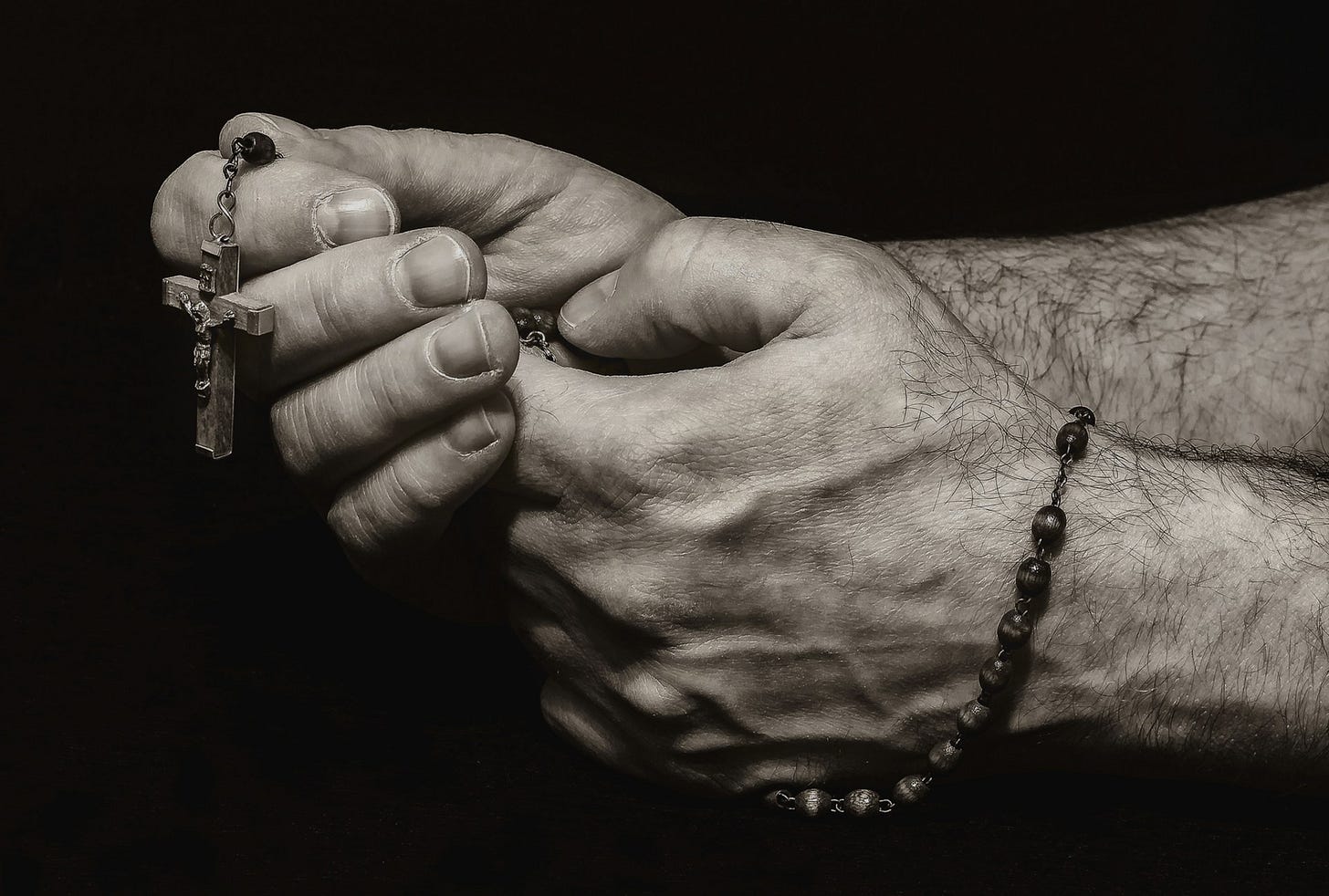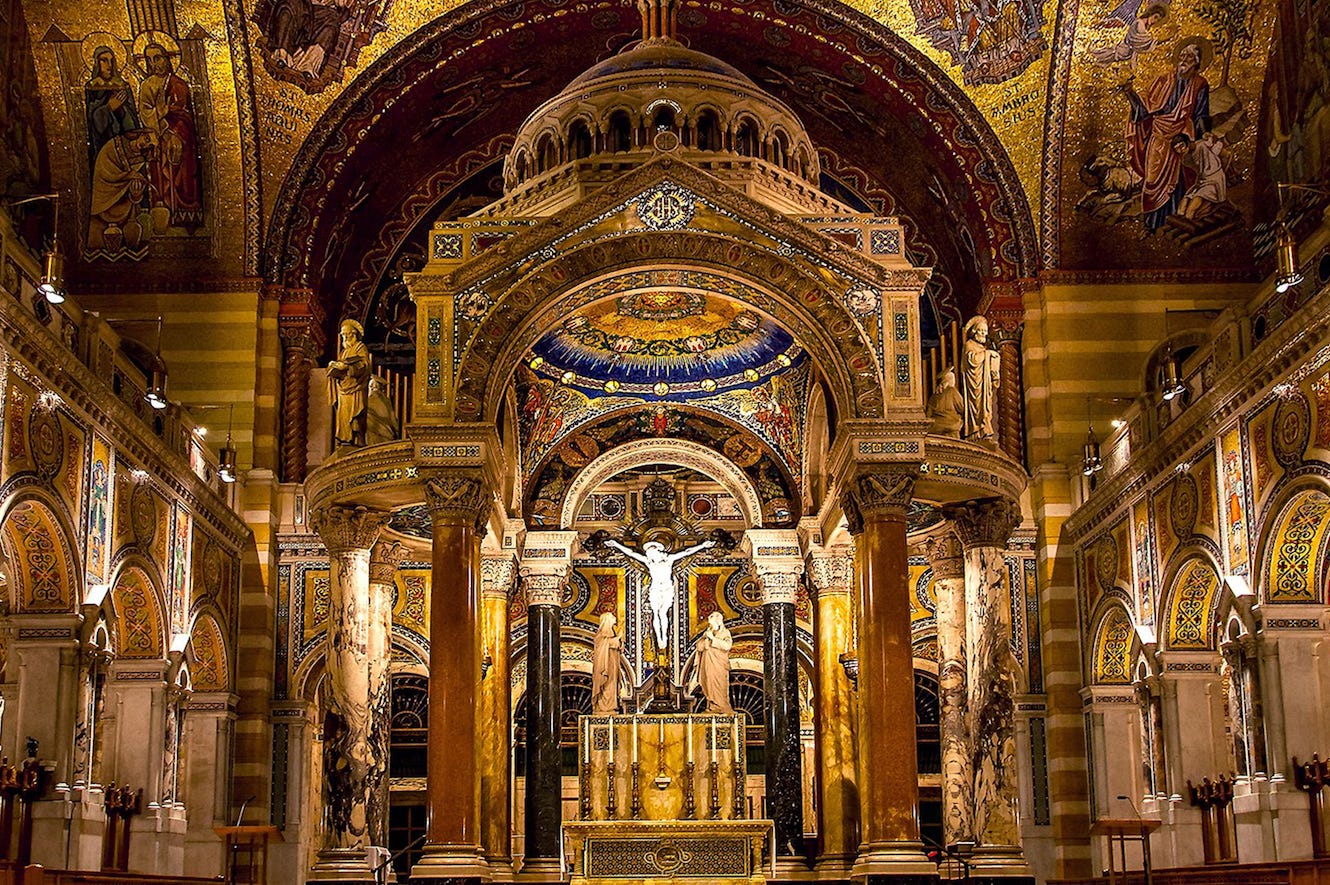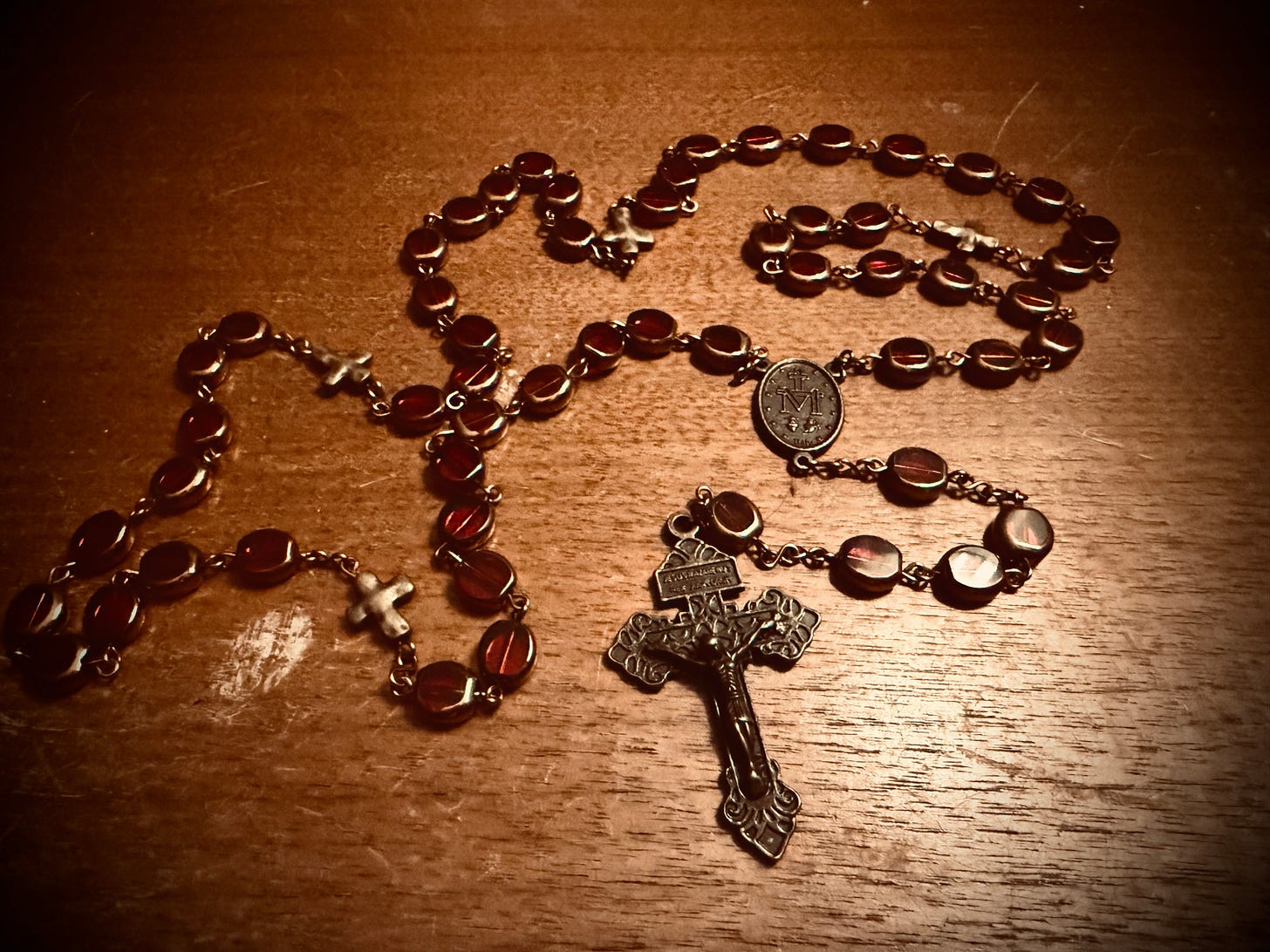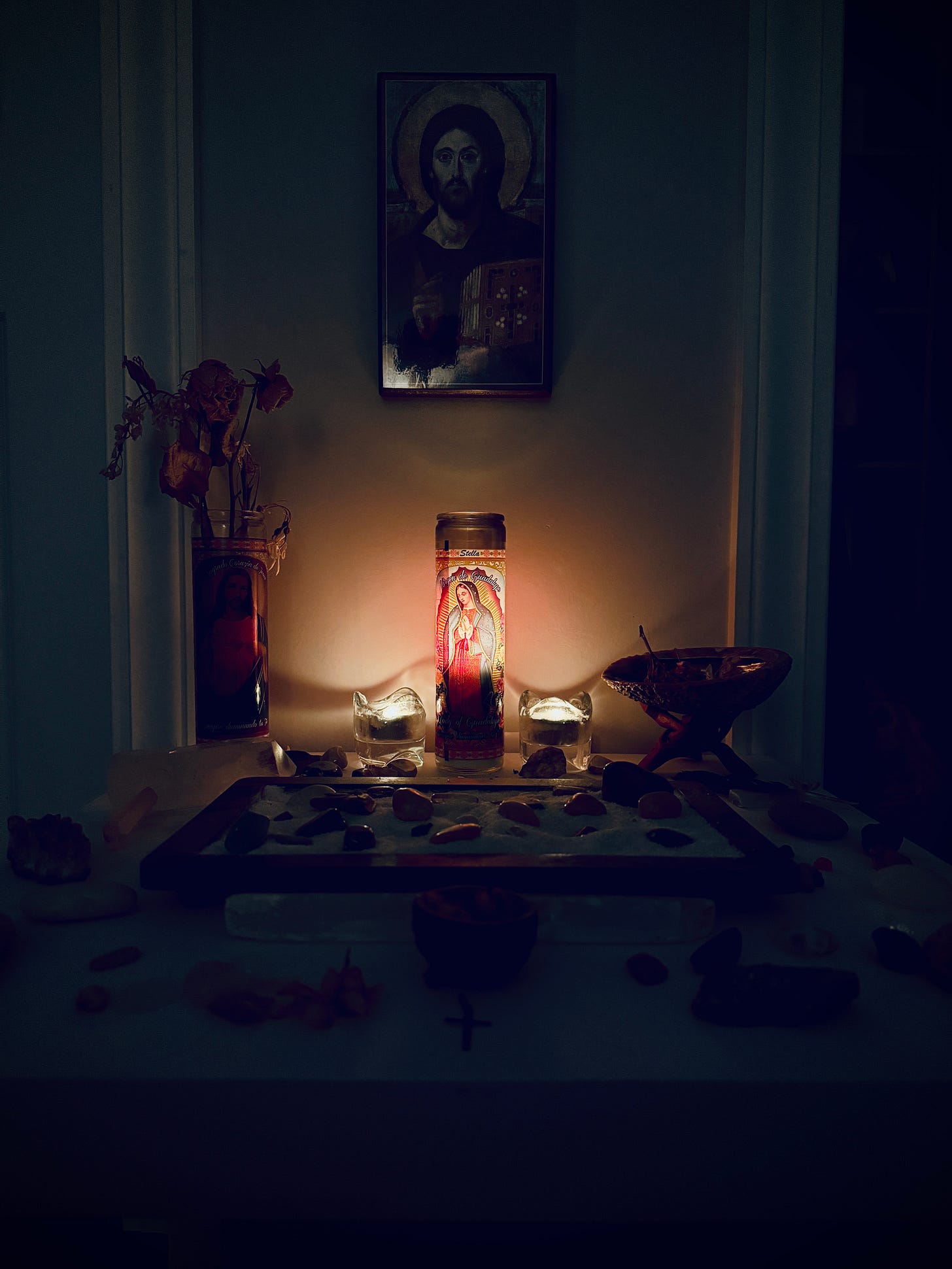From Skeptic to Beads: Why the Rosary Hooked This New Catholic Convert
A Rookie Catholic’s Journey into the Power of Mary’s Prayer
I am a new convert to the Catholic faith. Very new, in fact. As I explained in my recent testimony, my conversion was fundamentally a response to the sexual sin of autogynephilia, a paraphilia (fetish) that I have been struggling with since childhood, that also drove me into the dangerous ideology of gender identity and transgenderism when I was 28 years old, after a lifelong history of fetishistic crossdressing.
After living as a trans-identified person for eight years and subjecting myself to cross-sex hormones, in the summer of 2023 I detransitioned to realign my sexual identity with the ontological reality of having been made male by God through the divine wisdom of His eternal blueprint.
At the time of detransition, however, I didn’t necessarily understand things in that way quite yet. I considered myself to be mostly “spiritual, but not religious.” I had constructed my own personal religion of New Age spirituality compiled from a pastiche of different traditions and esoteric knick-knacks.
As part of my spiritual exploration, I discovered what one might call the tradition of “esoteric Christianity,” as exemplified by the likes of people like Fr. Richard Rohr.
I believe Fr. Rohr to be a spiritually wise and humble man, but he always seems reluctant to fully embrace orthodox belief, often suggesting that to straightforwardly assent to orthodox Christianity without “esotericizing” it is to be intellectually naive, as if one must be some kind of yokel to be theologically conservative and actually truly believe in the propositions of orthodoxy.
When asked if Christ as a historical person literally raised from the dead, my guess is he would likely reframe the question in terms of a broader framework of “Universal Christ Consciousness” as a universal esoteric principle or something to that effect.
Indeed, the general thrust of criticism from conservative theologians is that Fr. Rohr risks collapsing into a kind of New Age spirituality that makes it impossible to just straightforwardly believe in the propositional truth of the Creeds.
The likes of Rohr are indeed skeptical of framing Christianity in terms of a rational intellectual assent to any kind of propositional knowledge because the whole emphasis is to reject propositional knowledge in favor of “non-dual experience.”
Another issue is that the likes of Rohr are far more likely to embrace a progressive stance on LGBT issues, and in general to be prone to a more theological liberality.
Nevertheless, I am grateful I discovered this tradition of “mystical” or “contemplative” Christianity through authors like Fr. Rohr, Thomas Merton, James Finley, Cynthia Bourgeault, Thomas Keating, Meister Eckhart, etc.
Growing up Southern Baptist, I was never taught about the contemplative and monastic tradition of Christianity, something I would have probably appreciated in my youth when I abandoned Christianity in high school, became a hard-core agnostic atheist, and turned to Eastern philosophies such as Zen Buddhism to find meaning and purpose in a cold, dead universe I considered to be completely void of intrinsic meaning and purpose.
However, this sort of esoteric, non-dualistic, progressive Christianity did not nourish me for long. Without the ecclesial assent to orthodoxy uniting me into a community of believers by shared profession of faith, I was essentially a “Church of one” and solo operator. This was deeply unsatisfying to me not only spiritually but intellectually. I languished in this lost and confused state for many years.
Long story short, a couple of weeks ago, addicted in vice, I was struggling with the sexual sin of my autogynephilic paraphilia, and God convicted my conscience in a suddeny epiphany to give up not only my sexual addiction but my twenty-year cannabis addiction as well that fueled my hedonistic self-abuse.
I felt immediately pulled towards the local Cathedral Basilica almost entirely on the premise of its superior aesthetics and mind-bogglingly beautiful architecture:
I felt such strong resistance to attending a non-denominational Protestant church knowing all such places of worship paled in comparison to the superior aesthetics of Catholicism. Somewhere in the back of my mind, I intuited that the master artisans of the Cathedral Basilica could only possibly have created such out-of-this-world beauty under the inspiration of God as inheritors of the True Christian Faith, for I had never felt the kind of reverence or awe I experienced in Protestant churches as when I did stepping inside this Catholic Cathedral.
Moreover, I was very much attracted to high liturgical worship styles in reaction to my youthful rebellion against the rock concert worship and fire and brimstone preaching of my Southern Baptist upbringing.
Accordingly, during my “esoteric Christianity” phase, in search of high liturgy, I attended the local Episcopal Cathedral in downtown St. Louis. It was a beautiful building and I liked the Episcopal Mass, but their hyper-focus on progressive politics and LGBT issues did not sit right with me, especially when, since my detransition, I had been making hundreds of videos on my YouTube channel critiquing the evils of gender identity ideology. Furthermore, I was well aware that the Anglican Church was on the verge of schism on the LGBT issue, and most of the clergy were progressive in their theology, which never sat right with me intellectually.
But the only thing that was stopping me from joining the Catholic Church instead of the Episcopal Church was that from my research I knew that the only way I could be in good standing to take the Eucharist was if I accepted the Catholic Church’s teaching on homosexual acts being intrinsically disordered.
And as a good liberal of 20 years with many LGBT friends, and being bisexual myself and a longtime believer in being “sex positive” and “kink friendly,” such a belief was anathema to everything I believed given that within the modern secular framework of consent-based sexual ethics, so long as there is consent between two adults, or consent to yourself, then no sexual act was intrinsically wrong because the rightness or wrongness of an action was cashed out entirely in terms of whether it aligned with the subjective preferences of individualistic desire satisfaction, making humans our own best judge of what’s ultimately right or wrong such that if God’s eternal commands as shown through the Natural Law and Divine Revelation contradict the sincerely held moral intuitions of educated secular Westerners, then so much the worse for God and the Natural Law.
Intellectually I struggled with the Catholic Church’s Natural Law argument for the intrinsic wrongness of homosexual acts and had concocted all kinds of philosophical objections in order to prop up my intuition that we modern Westerners, enlightened as we are through the help of science and the onward progress of secularization, surely were in a better position in 2025 to judge the intrinsic moral wrongness of homosexuality compared to the backwards primitives who lived 2,000 years ago in an entirely different time and culture.
But it wasn’t until God radically and suddenly convicted my own conscience on the intrinsic moral wrongness of my own atypical autogynephilic masturbatory sexuality, which many people are trying to push as an innate atypical sexual orientation perfectly analogous to that of homosexuality, that I was able to assent intellectually to the proposition that homosexuality might be less than normatively ideal relative to God’s perfect divine blueprint for male and female sexual complementarity expressed through the sacred procreative, unitive communion of heterosexual lovemaking.
And as soon as I accepted the metaphysical possibility of Natural Law applying to sexual ethics, the scales fell from my eyes, and I was able to receive God’s Grace, freely repent from my sexual sins, and make a vow towards holy chastity given that I am now on my second divorce and the Church’s teaching on remarriage forbid sex unless I get both my marriages annulled (which, from my research, might not be possible with my first marriage.)
In other words, once I saw that the Church’s teaching called me towards lifelong chastity just the same as it calls homosexuals towards lifelong chastity, I realized that this is not a function of God hating my own flourishing, but indeed, of laying out a normative ideal whereby I can flourish according to a higher, transcendental ideal of holy sexuality.
The Contemplative Mysteries of the Holy Rosary
Immediately upon my conversion, I started attending daily mass at the Cathedral and praying the Rosary daily. After sharing my original testimony, many Catholic brothers in Christ extolled me to keep at these daily spiritual disciplines with the most serious of intent because I was still in grave spiritual danger of relapsing back into the comforting freedom of sexual indulgence in the name of hedonism and the secular platitude of, “Well, I’m not hurting anyone.”
And I cannot tell you how much this has been a salve to my wounded soul precisely insofar as it has provided me a true outlet for my love of the contemplative tradition within Christianity.
As part of my “esoteric” phase, I had already purchased a vintage Rosary that was quite beautiful:
But, as a solo practitioner of my own made-up New Age religion, rather than actually praying the Rosary, I essentially used it as a kind of amulet or charm and made up my own prayers. There was no structure. No deeper meaning. No connection to sacred Tradition. No genuine connection to the Blessed Holy Mary, Mother of God.
Indeed, one of the reasons I was attracted to esoteric Christianity was because I found in it the possibility of connecting to femininity in a way that I always felt was missing from my Protestant upbringing where such a concept would have been heretical. But in my esoteric journeys, I developed a love more for Sophiology than I did Marian devotion.
But now that I have come home to the Truth Faith of Catholicism, I am absolutely overjoyed to join in the long tradition of devotees to our Blessed Holy Mother, and not just that, but to have available to me the great spiritual gift of the Rosary so that I may have a structured, daily, contemplative prayer in my spiritual toolbox.
The other thing I love about Catholicism is that, unlike Protestantism, it positively encourages us to setup little shrines in our homes so that we may better focus our spiritual energies onto Holy Mother and the fruit of her womb, Jesus Christ.
Indeed, I have been able to rechannel my New Age love of spiritual knick-knacks and bric-à-brac into setting up a little shrine in my home where I can sit on a meditation pillow and pray the Rosary, something that brings me indescribable spiritual joy.
And not only does my newfound Marian devotion feed my soul, it is also giving me spiritual ammunition to bolster me in my intention to live a sexually pure life and resist any temptation for the masturbatory indulgences of my autogynephilic paraphilia and cannabis addiction.
And this brings me full circle with my exploration of the contemplative Christianity of Fr. Richard Rohr.
Instead of collapsing into relativistic theological progressivism, I finally have a proper outlet for my natural inclinations towards the mystical and contemplative dimensions of Christianity, guided by the sure Teaching of the Catholic Church, and the time-tested wisdom of all Her great Saints.






Ray you really have an eye for beauty, I think you’re an artist and a contemplative at heart. I love the rosary you picked up and I recommend you ask a priest to bless it and invite a priest over for dinner and to bless your home and your beautiful shrine with holy water. 🙂
Ray you are a deep thinker who has embraced this for its spiritual meaning for you and your life. Please don't reference yourself as a sinner because anyone who can unpack his life choices and realign himself with a truth he's discovered by his own initiative is honouring God and the gift of free will he's given you. Thank you for writing this as I really enjoyed reading it as it radiates peace and hope. Please feel proud of yourself and the ministry you practice in the transgender community as you are uniquely placed to be heard by many. I hope you never live your life under a cloud of guilt and shame over past life choices because those very life choices now make you a unicorn in a disordered world, and you have so much wisdom to contribute